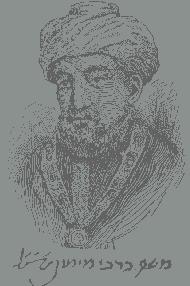

The Rambam - Moses Maimonides
(born 1134 - died 1204)
Being Jewish & A Professional: An Ancient Tradition
![]()

![]()
No less a luminary than the RAMBAM (MAIMONIDES) ( b.1134 - d.1204), the famous Torah authority and scholar of both holy and secular wisdom, was faced by the demands of both work and Torah study. Like many of the great Talmudic scholars before him, he practiced a profession. He was a physician, world-renowned for his knowledge and practice of medicine.
Dr. FRED ROSNER, in his book MAIMONIDES gives the following description of how Maimonides himself combined his Torah Learning with the demands of his career and daily life: "Although Chief Rabbi of the large Jewish community in Cairo, Maimonides turned to medicine as a livelihood after the tragic death of his brother David and the loss of the family fortune in a shipwreck. Maimonides' fame as a physician spread rapidly, and he was appointed physician to the Royal Court of Saladin, Sultan of Egypt. It is related that during the third Christian Crusade in neighboring Palestine, Richard the Lion-Hearted, King of England, asked Maimonides to become his personal physician, an offer which Maimonides declined.
The many facets of Maimonides as physician, theologian, scientist, philosopher and writer put a tremendous strain on him as described in the classic letter he wrote to his friend, disciple and most famous of all translators Rabbi Samuel Ibn Tibbon in 1199: '...I live in Fostat and the Sultan resides in Cairo; these two places are two Sabbath limits (marked off areas around a town within which it is permitted to move on the Sabbath; approximately one and a half miles) distant from each other. My duties to the Sultan are very heavy. I am obliged to visit him every day, early in the morning, and when he, any of his children or any one of his concubines are indisposed, I cannot leave Cairo but must stay during most of the day in the palace. It also frequently happens that one or two of the officers fall sick and I must attend to their healing. Hence, as a rule, every day, in the morning I go to Cairo. Even if nothing unusual happens there, I do not return to Fostat until the afternoon. Then I am famished, but I find the antechambers filled with people, both Jews and Gentiles, nobles and common people, judges and policemen, friends and enemies - a mixed multitude who await the time of my return.
I dismount from my animal, wash my hands, go forth to my patients and entreat them to bear with me while I partake of some light refreshment, the only meal I eat in 24 hours. Then I go to attend to my patients and write prescriptions and directions for their ailments. Patients go in and out until nightfall, and sometimes even, as the Torah is my faith, until two hours or more into the night. I converse with them and prescribe for them even while lying down from sheer fatigue. When night falls, I am so exhausted that I can hardly speak.
In consequence of this, no Israelite can converse with or befriend me (on religious or community matters) except on the Sabbath. On that day, the whole congregation, or at least the majority, comes to me after the morning service, when I instruct them as to their proceedings during the whole week. We study a little together until noon, when they depart. Some of them return and read with me following the afternoon service until evening prayers. In this manner, I spend the days. I have here related to you only a part of what you would see if you were to visit me...'
Thus, it seems even the more incredible that Maimonides found time to carry on so many pursuits and to indulge in the overwhelming amount of Rabbinic, medical, philosophic and other scientific writings that he did." (Preface pp. XII-XIV. Moses Maimonides. Feldheim, New York, 1975)
Indeed, in his magnum opus, the Mishneh Torah, or Yad Ha'Chazakah, he writes in the 'Laws of Torah Study': "Every person amongst Israel is obligated to learn Torah. Whether he be poor or rich, complete in body or afflicted, young or old; Even a person dependent on charity by going from door-to-door; And even a married person with children: All are obligated to fix a time for Torah study by day and at night, because it says 'And you shall meditate in it day and night'. (JOSHUAH. Chapter I, verse 8.) "Among the greatest and wisest in Israel were choppers of wood and drawers of water... and even so, they busied themselves with Torah day and night. They were part of the ancient traditions stretching back to Moses our teacher." (Free Translation from Sefer Mada. Hilchos Talmud Torah. Ch. I. (8 & 9).)
These descriptions about and by Maimonides define the essence of what each and every Jew should be doing. At our Center, The Jewish Professionals Institute, the timeless words of Maimonides come to life with every class, seminar, lecture, and discussion.